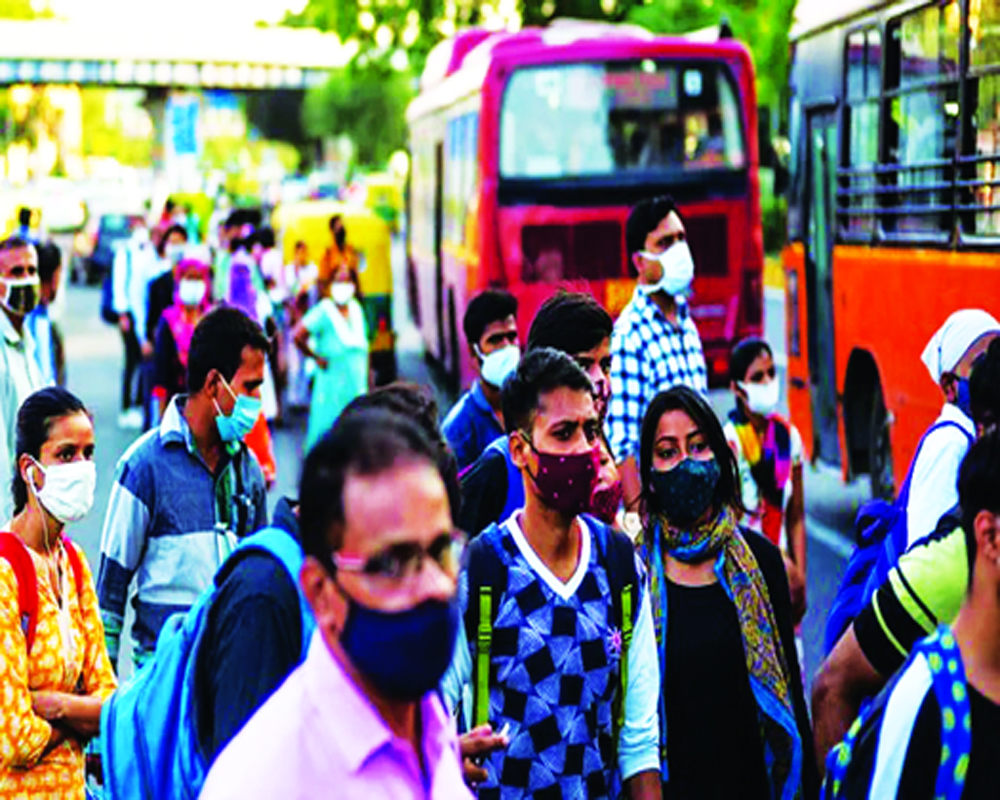Delhi Covid-19 cases shot up in April when Alpha was displaced by Delta rise: Study
The severe outbreak of Covid-19 in Delhi in first quarter of this year when cases shot up from approximately 2,000 daily cases to alarming 20,000 (between 31 March and 16 April) showed that not only the Delta variant of SARS-CoV2 is extremely transmissible but that it can also infect individuals previously infected by different strains of the virus, according to a team of international scientists.
SARS-CoV-2 had spread widely throughout India in the first wave, with initial results from the Indian Council of Medical Research (ICMR) finding one in five (21%) adults and one in four (25%) 10 to 17-year-old adolescents had been infected. The figures were much higher in Indian megacities like Delhi where by February 2021, over a half (56%) of individuals were thought to have been infected.
Since the first case of Covid-19 was detected in Delhi in March 2020, the city had experienced multiple outbreaks, in June, September and November 2020. After reaching a high of almost 9,000 cases daily in November 2020, new cases steadily declined, with very few new infections between December 2020 and March 2021.
However, the situation reversed dramatically in April 2021 when Delhi reported 20,000 infections every day with huge rise in hospitalisations and ICU admissions, severely stressing the healthcare system, with daily deaths spiking to levels three-fold higher than previous waves.
The international team of scientists led by the National Centre of Disease Control (NCDC) and the CSIR Institute of Genomics and Integrative Biology, India, with collaborators from the University of Cambridge and Imperial College London, UK, and the University of Copenhagen, Denmark used genomic and epidemiological data, together with mathematical modelling, to study the outbreak.
Continued on Page 2
Shield generated by Covid strains not immune to Delta
Following sequence and analyzing viral samples from Delhi from the previous outbreak in November 2020 until June 2021, the scientists found that the 2020 outbreaks in Delhi were unrelated to any variant of concern. The Alpha variant (B.1.1.7) was identified only occasionally, primarily in foreign travellers, until January 2021. The Alpha variant increased in Delhi to about 40% of cases in March 2021, before it was displaced by a rapid increase in the Delta variant (B.1.617.2) in April.
Applying mathematical modelling to the epidemiological and genomic data, the researchers found that the Delta variant was between 30-70% more transmissible than previous SARS-CoV-2 lineages in Delhi, including the Alpha variant. Importantly, the model also suggested that the Delta variant was able to infect people who had previously been infected by SARS-CoV-2 -- prior infection provided only 50-90% of the protection against infection with Delta variant that it provides against previous lineages.
To look for actual evidence of re-infection to support their modelling work, the researchers examined a cohort of individuals recruited by the Council of Scientific and Industrial Research (CSIR), India. In February, 42.1% of unvaccinated subjects participating in the study had tested positive for antibodies against SARS-CoV-2. In June, the corresponding number was 88.5%, suggesting very high infection rates during the second wave. Among 91 subjects with prior infection before Delta, about one-quarter (27.5%) showed increased levels of antibodies, providing evidence of reinfection.
When the team sequenced all the samples of vaccination-breakthrough cases at a single centre over the period of the study, they found that among 24 reported cases, Delta was seven-fold more likely to lead to vaccination breakthroughs than non-Delta lineages.
Dr Anurag Agrawal from the National Centre of Disease Control and the CSIR Institute of Genomics and Integrative Biology, India, senior author and co-lead investigator, said, “This work helps understand the global outbreaks of Delta, including in highly vaccinated populations, because the Delta variant can transmit through vaccinated or previously infected people to find those who are susceptible.”
Co-author professor Ravi Gupta from the Cambridge Institute of Therapeutic Immunology and Infectious Disease at the University of Cambridge, UK, said, “The concept of herd immunity is critical in ending outbreaks, but the situation in Delhi shows that infection with previous coronavirus variants will be insufficient for reaching herd immunity against Delta. The only way of ending or preventing outbreaks of Delta is either by infection with this variant or by using vaccine boosters that raise antibody levels high enough to overcome Delta’s ability to evade neutralisation.”


























